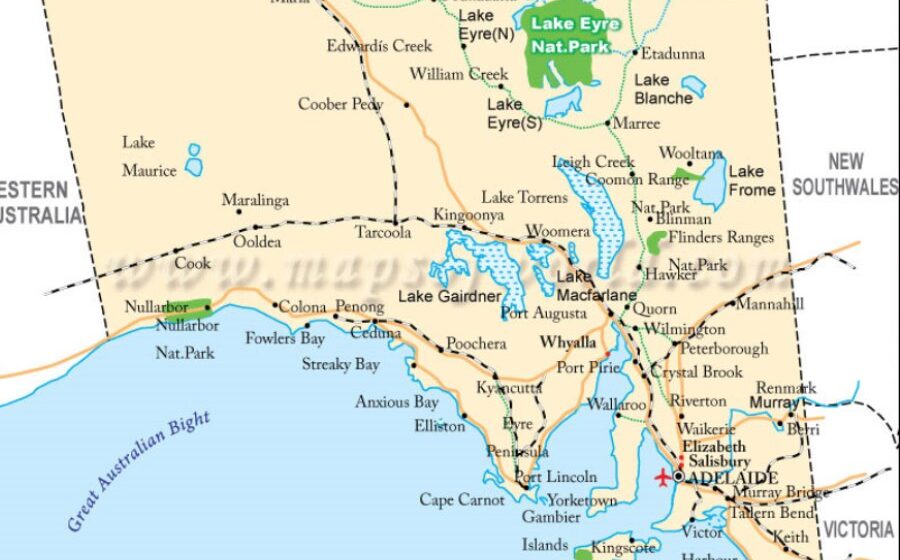Hundreds have fled South Australia as it enters the nation’s toughest-ever COVID-19 lockdown, but confusion has been raised over the state’s travel restrictions.
While South Australians will be banned from leaving their homes except for essential reasons, even for exercise, they are still allowed to travel interstate.
And, on the flipside, interstaters are welcome to enter South Australia.
Airports will be operating as usual with scheduled departures and arrivals to go ahead.
However, restrictions apply depending on which jurisdictions you are leaving from or entering into.
Within 24 hours on Monday, South Australia was effectively shut out of half the country with WA, Tasmania, the NT and QLD slamming their borders shut.
South Australia currently has no border restrictions with any state but Victoria, meaning anyone from other states or territories is free to enter without quarantine.
Only those granted an exemption or deemed an essential traveller, a returning school or university student, or those relocating permanently can enter South Australia from Victoria.
Here’s what each state’s restrictions are with South Australia.
Victoria
Victoria’s border will be closed completely to South Australia for 48 hours starting 11.59pm on Thursday.
Following that, a permit system will be introduced for the next 14 days.
Under the hard closure, only those allowed to cross the border from South Australia will be freight drivers and those with medical or emergency reasons or for urgent animal welfare.
The final details of the permit scheme are yet to be finalised, but the reasons to enter Victoria from South Australia from Saturday night will include:
- if you are an emergency services worker or a worker providing essential services
for agricultural work - to receive medical care (including seeking coronavirus testing), obtain medical supplies or compassionate reasons
- to shop to obtain essential supplies
More details about exemptions can be found on the Department of Health and Human Services website.
New South Wales
New South Wales’ borders are completely open to South Australia, but residents have been urged not to travel unless completely necessary.
Travellers arriving from South Australia will have their temperature checked and undergo an interview to determine if they have been in any areas of concern.
Australian Capital Territory
Similar to NSW, the ACT will screen those arriving from South Australia.
Anyone with COVID-19 symptoms or who has been in a hotspot will be required to get tested and self-isolate until their results are returned.
Western Australia
Western Australia has a hard border closure in place with South Australia, meaning no entry for anyone except those granted an exemption.
The list of people deemed essential travellers for the purposes of border restrictions can be found on the WA government website.
Queensland
Queensland has declared the metropolitan Adelaide region a COVID-19 hotspot for the purposes of border controls.
This means no entry into the sunshine state for anyone who has been in Adelaide over the past 14 days.
Regional South Australians are allowed to travel but, given Adelaide Airport is deemed to be within a hotspot area, would only be able to enter Queensland via road.
There is also an exemption to the rules for anyone in a South Australian hotspot between 2 and 8 November.
The full list of Adelaide hotspots and border declaration forms can be found on the Queensland government’s website.
Tasmania
South Australia has now been deemed a medium-risk area by the Tasmanian government, meaning those entering the state will be required to quarantine for 14 days.
Those who still wish to travel will need to fill out a G2G pass before their arrival.
Northern Territory
The Northern Territory has also declared metropolitan Adelaide a COVID-19 hotspot, meaning anyone entering the Territory from the southern state will need to complete 14 days of supervised quarantine.
This will be done at a hotel facility at the traveller’s own expense.
The rate is $2,500 per person or $5,000 for a family of two or more people.
More details about border passes and COVID-19 hotspot areas can be found on the NT government website.
Lockdown begins
South Australia’s streets are now bare as the state enters six days under unprecedented COVID-19 restrictions.
From 11.59pm Wednesday hospitality venues, pubs, bars, retail stores and most offices were shut down except for those deemed essential in a “circuit breaker” to contain a COVID-19 cluster.
The government says the pause in most community activities will significantly reduce the risk of the virus spreading further.
It could also prevent the need for a much longer Victorian-style shutdown.
“We need this circuit breaker, this community pause. We are at a critical point,” Premier Steven Marshall said.
All schools are also closed along with universities, cafes, food courts and takeaway food outlets.
Regional travel is banned and aged care centres are in lockdown.
Factories are closed, along with the construction industry, and elective surgery has ceased.
Weddings and funerals are banned along with all outdoor sport and exercise and masks will be required outside the home.
However, South Australians have welcomed some good news thus far with zero new cases identified after a record 12,000 tests on Thursday.
The total number of active cases linked to the Parafield cluster remains at 22.
A further 17 people are suspected to have contracted COVID-19 and are being treated as through they are positive cases.




Leave a Reply